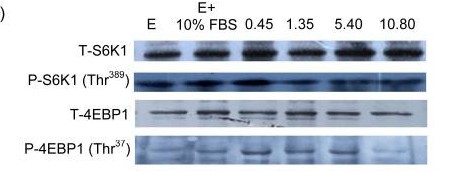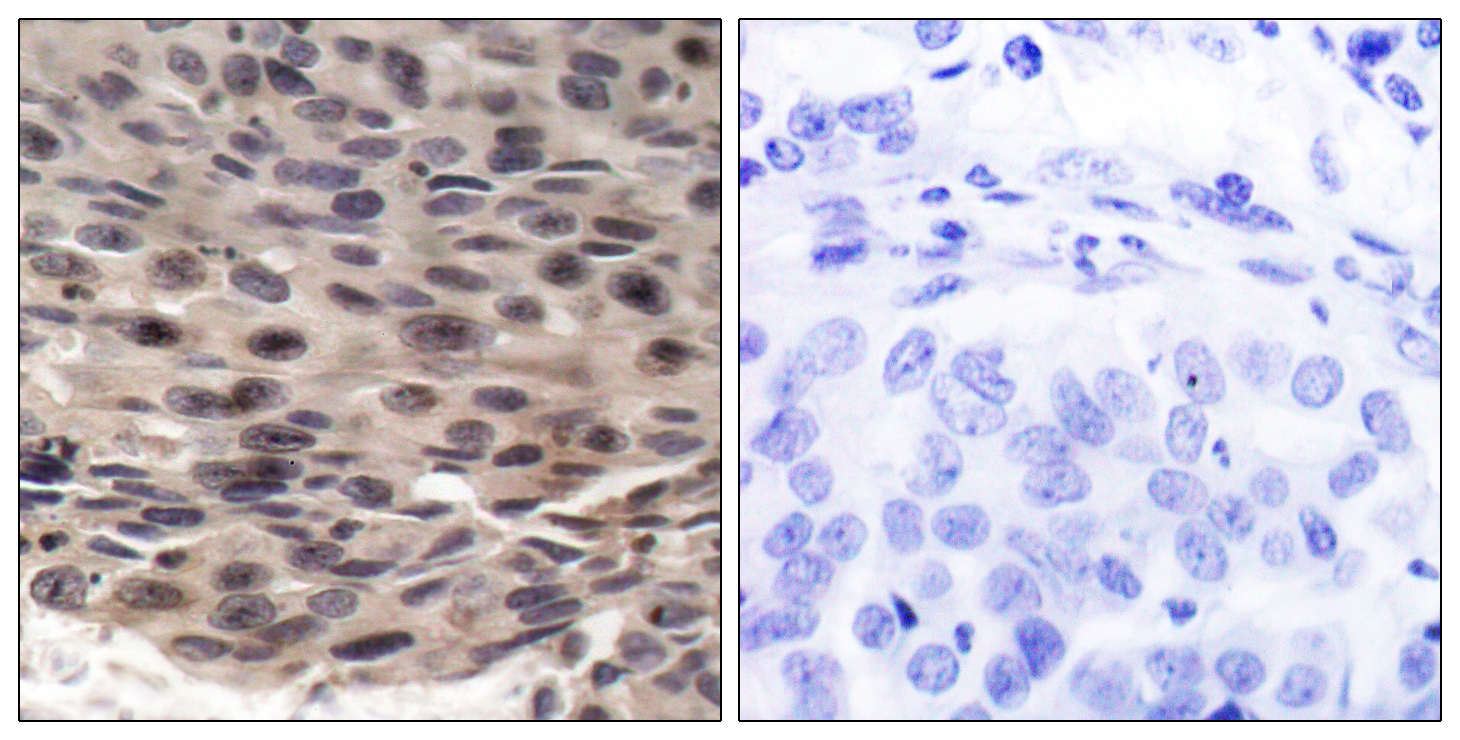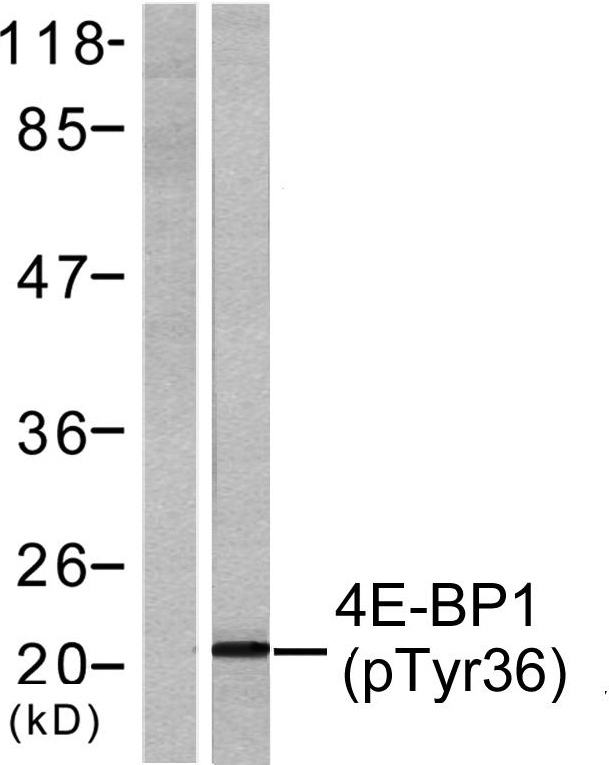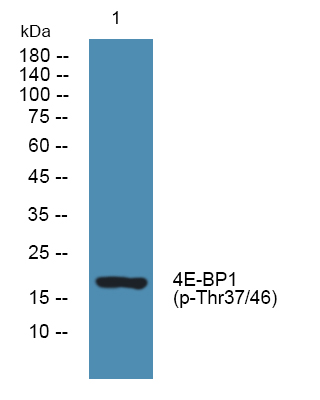4E-BP1 (phospho Thr37) Polyclonal Antibody
- Catalog No.:YP0001
- Applications:WB;IHC;IF;ELISA
- Reactivity:Human;Mouse;Rat;Rabbit;Ch;Mk;sheep;X;Fish;Chicken;Guinea pig;Guinea pig;Sheep;Bovine
- Target:
- 4E-BP1
- Fields:
- >>EGFR tyrosine kinase inhibitor resistance;>>ErbB signaling pathway;>>HIF-1 signaling pathway;>>mTOR signaling pathway;>>PI3K-Akt signaling pathway;>>AMPK signaling pathway;>>Longevity regulating pathway;>>Cellular senescence;>>Insulin signaling pathway;>>Human cytomegalovirus infection;>>Human papillomavirus infection;>>Herpes simplex virus 1 infection;>>Chemical carcinogenesis - receptor activation;>>Acute myeloid leukemia;>>Choline metabolism in cancer
- Gene Name:
- EIF4EBP1
- Protein Name:
- Eukaryotic translation initiation factor 4E-binding protein 1
- Human Gene Id:
- 1978
- Human Swiss Prot No:
- Q13541
- Mouse Gene Id:
- 13685
- Mouse Swiss Prot No:
- Q60876
- Rat Gene Id:
- 116636
- Rat Swiss Prot No:
- Q62622
- Immunogen:
- The antiserum was produced against synthesized peptide derived from human 4E-BP1 around the phosphorylation site of Thr36. AA range:4-53
- Specificity:
- Phospho-4E-BP1 (T37) Polyclonal Antibody detects endogenous levels of 4E-BP1 protein only when phosphorylated at T37.
- Formulation:
- Liquid in PBS containing 50% glycerol, 0.5% BSA and 0.02% sodium azide.
- Source:
- Polyclonal, Rabbit,IgG
- Dilution:
- WB 1:500 - 1:2000. IHC 1:100 - 1:300. ELISA: 1:10000.. IF 1:50-200
- Purification:
- The antibody was affinity-purified from rabbit antiserum by affinity-chromatography using epitope-specific immunogen.
- Concentration:
- 1 mg/ml
- Storage Stability:
- -15°C to -25°C/1 year(Do not lower than -25°C)
- Other Name:
- EIF4EBP1;Eukaryotic translation initiation factor 4E-binding protein 1;4E-BP1;eIF4E-binding protein 1;Phosphorylated heat- and acid-stable protein regulated by insulin 1;PHAS-I
- Observed Band(KD):
- 18kD
- Background:
- eukaryotic translation initiation factor 4E binding protein 1(EIF4EBP1) Homo sapiens This gene encodes one member of a family of translation repressor proteins. The protein directly interacts with eukaryotic translation initiation factor 4E (eIF4E), which is a limiting component of the multisubunit complex that recruits 40S ribosomal subunits to the 5' end of mRNAs. Interaction of this protein with eIF4E inhibits complex assembly and represses translation. This protein is phosphorylated in response to various signals including UV irradiation and insulin signaling, resulting in its dissociation from eIF4E and activation of mRNA translation. [provided by RefSeq, Jul 2008],
- Function:
- function:Regulates eIF4E activity by preventing its assembly into the eIF4F complex. Mediates the regulation of protein translation by hormones, growth factors and other stimuli that signal through the MAP kinase pathway.,PTM:Phosphorylated on serine and threonine residues in response to insulin, EGF and PDGF. Phosphorylated upon DNA damage, probably by ATM or ATR.,similarity:Belongs to the eIF4E-binding protein family.,subunit:Nonphosphorylated EIF4EBP1 competes with EIF4G1/EIF4G3 to interact with EIF4E; insulin stimulated MAP-kinase (MAPK1 and MAPK3) phosphorylation of EIF4EBP1 causes dissociation of the complex allowing EIF4G1/EIF4G3 to bind and consequent initiation of translation. Rapamycin can attenuate insulin stimulation, mediated by FKBPs.,
- Subcellular Location:
- nucleoplasm,cytoplasm,cytosol,protein complex,
- Expression:
- Colon,Epithelium,Lung,Placenta,Platelet,
Bacillus subtilis Produces Amino Acids to Stimulate Protein Synthesis in Ruminal Tissue Explants via the Phosphatidylinositol-4,5-Bisphosphate 3-Kinase Catalytic Subunit Beta–Serine/Threonine Kinase–Mammalian Target of Rapamycin Complex 1 Pathway WB Bovine 1:1000 rumen explants/
Autophagy and apoptosis mediated nano-copper-induced testicular damage. ECOTOXICOLOGY AND ENVIRONMENTAL SAFETY Ecotox Environ Safe. 2022 Jan;229:113039 WB Rat Testis
d-Glucose and amino acid deficiency inhibits casein synthesis through JAK2/STAT5 and AMPK/mTOR signaling pathways in mammary epithelial cells of dairy cows. JOURNAL OF DAIRY SCIENCE J Dairy Sci. 2018 Feb;101:1737 WB Bovine cow mammary epithelial cells (CMEC)
Gao, Hai-na, et al. "Leucine and histidine independently regulate milk protein synthesis in bovine mammary epithelial cells via mTOR signaling pathway 亮氨酸和组氨酸通过 mTOR 信号通路调控奶牛腺上皮细胞中酪蛋白的合成." Journal of Zhejiang University-SCIENCE B 16.6 (2015): 560-572.
Distribution characteristics and regulation of amino acids and fatty acids in muscle and adipose tissues of sheep grown in natural grazing environment ANIMAL SCIENCE JOURNAL Jinling Cao WB Sheep
- June 19-2018
- WESTERN IMMUNOBLOTTING PROTOCOL
- June 19-2018
- IMMUNOHISTOCHEMISTRY-PARAFFIN PROTOCOL
- June 19-2018
- IMMUNOFLUORESCENCE PROTOCOL
- September 08-2020
- FLOW-CYTOMEYRT-PROTOCOL
- May 20-2022
- Cell-Based ELISA│解您多样本WB检测之困扰
- July 13-2018
- CELL-BASED-ELISA-PROTOCOL-FOR-ACETYL-PROTEIN
- July 13-2018
- CELL-BASED-ELISA-PROTOCOL-FOR-PHOSPHO-PROTEIN
- July 13-2018
- Antibody-FAQs
- Products Images

- Gao, Hai-na, et al. "Leucine and histidine independently regulate milk protein synthesis in bovine mammary epithelial cells via mTOR signaling pathway 亮氨酸和组氨酸通过 mTOR 信号通路调控奶牛腺上皮细胞中酪蛋白的合成." Journal of Zhejiang University-SCIENCE B 16.6 (2015): 560-572.

- Enzyme-Linked Immunosorbent Assay (Phospho-ELISA) for Immunogen Phosphopeptide (Phospho-left) and Non-Phosphopeptide (Phospho-right), using 4E-BP1 (Phospho-Thr36) Antibody

- Immunohistochemistry analysis of paraffin-embedded human breast carcinoma, using 4E-BP1 (Phospho-Thr36) Antibody. The picture on the right is blocked with the phospho peptide.

- Western blot analysis of lysates from MDA-MB-435 cells treated with EGF 200ng/ml 30', using 4E-BP1 (Phospho-Thr36) Antibody. The lane on the left is blocked with the phospho peptide.

- Western blot analysis of lysates from SH-SY5Y cells, primary antibody was diluted at 1:1000, 4°over night



